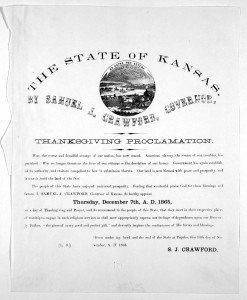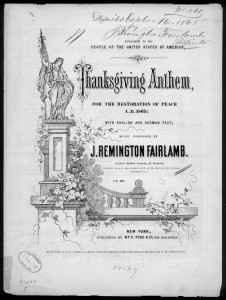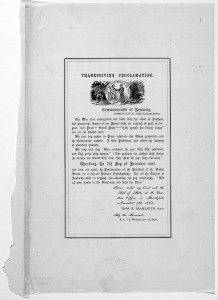The war has been worth all that it cost the nation; the sacrifice has been great, but the benefit greater.
President Andrew Johnson proclaimed December 7, 1865 a national Day of Thanksgiving. I don’t know if the first part of the following article is an editorial or actually part of the “SERMON BY REV. J.R.W. SLOANE, THIRD REFORMED PRESBYTERIAN CHURCH, TWENTY-THIRD-STREET.”
From The New-York Times December 8, 1865:
The Abolition of Slavery the Chief Cause for Thanksgiving.
The circumstances connected with our present Annual Thanksgiving are Greatly altered from those of the past four years. Then the dark cloud of civil war overhung our country. Jehovah was marching through the land in His anger, the pealm of thanksgiving mingle with the “braying discord” of arms and the “confused noise” of battle. The storm has passed, the last muttering thunders have died away, the bow appears in the clouds, the sunlight of peace is bright over all the recently-darkened land, the sword is being beaten into the plowshare and the spear into the pruning-hook, we hear no more “the sound of the trumpet, the alarm of war.” As Reformed Presley events, the sworn friends of civil and religious liberty, and the uncompromising foes of slavery in all its forms, we found cause of thanksgiving even in the terrible visitation of war. Not on its own account, not because we delighted in blood; God is our witness that we did not “desire the woful day.” In common with others we felt its burdens; we, too, mourned our dead; the sorrows of the nation were our sorrows, but because of the results that we foresaw must flow from this calamity in itself so dark and terrible. We have reason to rejoice that our judgment has been justified by the events, that out of the mouth of this eater has come forth meat, and from this strong one honey. “War is,” in the language of ROBERT HALL, “the garment of vengeance in which the Deity arrays himself when he comes forth to punish the inhabitants of the earth.” “It is the day of the Lord cruel both with wrath and fierce anger.” All this has been realized in our great struggle, it has cost us many millions of money, hundreds of thousands of noble and precious lives, and left behind it that train of evils which are its inevitable accompaniments. We cannot be sufficiently thankful that the ordeal is passed, the temple of Janus closed, and that we can now apply ourselves to the cultivation of the arts of peace and to healing the wound which war has made. The great blessing that has flowed to us from the late conflict is the destruction of slavery; it was only desirable that the Union should be preserved and the government saved, that it might be the defender of liberty. The war has been worth all that it cost the nation; the sacrifice has been great, but the benefit greater. How great a cause of thankfulness we have in the destruction of this wickedness, those only can realize who have formed a true conception of the system, and of its far-reaching and destructive influence. The war has taught the nation a lesson which it was slow to learn, but taught it effectually. The system is among the things of the past; and, although its effects may remain for many years “as the waves will continue to dash upon the shore long after the storm is down,” the institution has died or the deadly wound that our martyr President gave it in the Emancipation Proclamation and will be, as we trust, by the present Congress, buried out of sight and have its grave sealed forever. We who have borne reproach from our youth for opposition to this iniquity cannot repress our joy at its fall. We take up the language of exultation: “Rejoice over her thou heaven and ye holy apostles and prophets, for God hath avenged you on her. Let the old devotees of this Moloch cast dust upon their heads and cry Alas! alas! Our feelings are those of joy to hear the crash of its falling ruins, as it sinks into the abyss and goes down to the blackness of darkness forever.” We hope to leave our children in a country in which it will be no reproach to love liberty and hate slavery. The speaker then passed to the consideration of other topics, as grounds of thanksgiving, such as the wasting of the Mohammedan power in the East, the approaching termination of the temporal power of the Pope, the spread of liberal principles in all the nations of Europe, the rapid spread of the gospel, &c., &c. He then turned to a consideration of the method in which our thankfulness should be expressed.
SERMON BY REV. J.R.W. SLOANE, THIRD REFORMED PRESBYTERIAN CHURCH, TWENTY-THIRD-STREET. …
________________________________________________
Thanks to Daily Observations from the Civil War I learned that I’m not the only Finger Lakes resident who thought a December Thanksgiving was a bit unique. Like NY City the weather was bad in Canandaigua. Miss Richards listened to a sermon that gave thanks for the end of the war, the preservation of the Union, and the abolition of slavery. Oysters and a big turkey for dinner.




